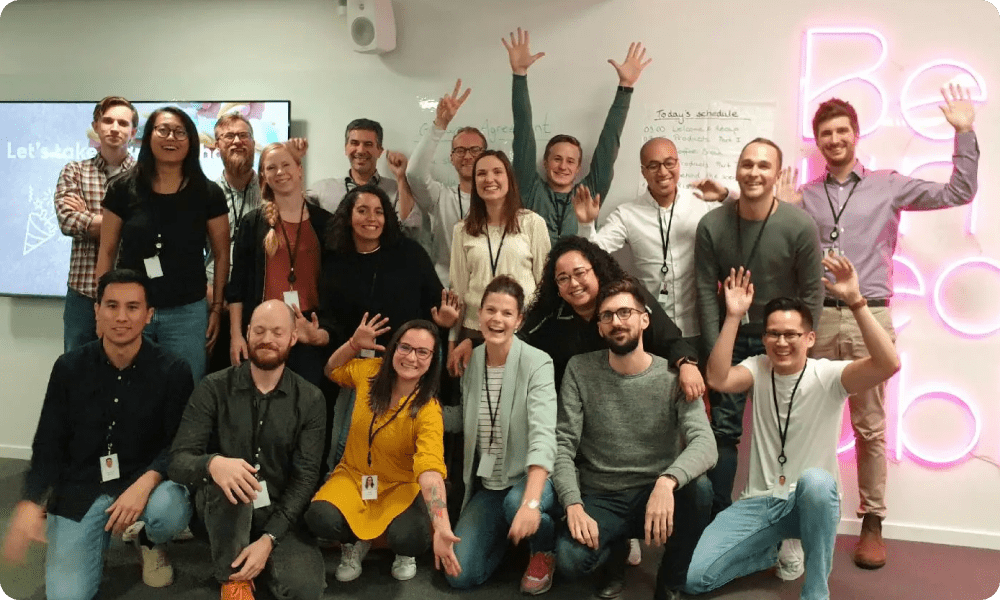Marketplace Regolith
Your investment opportunities

Klarna
BNPL-focused fintech company
Updated on 27 Jan 2026

Sebastian Siemiatkowski
Co-Founder & CEO
“Klarna isn’t just payments anymore — it’s a $100-billion global fintech with 100 million customers.”
5-30%
Allocation
$1,000
Price
$1,000
Min. investment

Updated on 27 Jan 2026
Why Klarna Is a Must-Have in Your Portfolio
Swedish fintech company and the largest European BNPL service (Buy Now, Pay Later): over 150 million users and more than 500,000 retail partners worldwide — from H&M and IKEA to Nike and Sephora.
The company aims to raise $1.24 billion, making this IPO one of the largest fintech offerings in 2025.
Financial performance — annual revenue above $2 billion, with processed transaction volume exceeding $100 billion.
Strong investors — Sequoia, Silver Lake, Visa, Ant Group, SoftBank. At its peak, the company was valued at $45.6 billion.
Global expansion — operations in more than 45 countries, with key markets in the U.S., Europe, and Australia.
Exclusive Participation Terms
IPO Klarna — one of the most anticipated fintech offerings of the year. The deadline for applications and account funding is Tuesday, 6:00 PM (UAE).
Klarna is a rare opportunity to invest in Europe’s leading fintech company, which set the standard for BNPL payments in e-commerce and continues to deliver solid growth across key metrics. Investors are already calling it the “BNPL equivalent of PayPal.”
Key highlights
IPO Klarna: one of the largest fintech listings of the year, a clear indicator of investor appetite for the BNPL sector.
Fintech ecosystem: expanding beyond BNPL to build a super-app with payments, shopping feed, and credit products.
Innovation: Klarna’s AI shopping assistant already processes millions of user requests and reduces the load on customer support.
Institutional focus: compliant with regulatory requirements across the U.S., EU, and Australia.
Investors: Sequoia, Silver Lake, Visa, Ant Group, SoftBank — leading global funds and corporations already on the cap table.
Strong metrics: 150 million users, annual revenue above $2 billion, processed transaction volume exceeding $100 billion.
The Founding and Growth of Klarna
Klarna was founded in 2005 in Stockholm and became one of the pioneers of the BNPL model, allowing customers to split payments into installments with no interest.
Three students from the Stockholm School of Economics — Sebastian Siemiatkowski, Victor Jacobsson, and Niklas Adalberth — launched a service that let shoppers receive their goods immediately and pay later. This was the birth of Klarna, a company that reshaped the way online payments could work.
At first, it was a simple “get now — pay in 30 days” solution. But demand proved so strong that within a few years Klarna grew into an international player. In 2013, the company acquired the German service Sofort, later secured a banking license, and began offering a wider range of financial services.


The “Buy Now, Pay Later” model became its signature. Klarna gave merchants the ability to receive payments instantly while offering consumers freedom of choice: pay upfront, split the cost into installments, or defer it. This made the company a symbol of the new fintech era.
In 2021, Klarna’s valuation hit $45 billion — making it the most valuable startup in Europe. Today, the company has over 111 million users and nearly 800,000 merchant partners worldwide. And despite valuation adjustments in the years that followed, Klarna continues to evolve — from a pure BNPL service into a full fintech ecosystem with banking products, cashback, and AI-driven tools.
Now it is preparing to go public on the New York Stock Exchange with a valuation of around $14 billion, aiming to cement its position as one of the key players in global financial technology.
Frequently Asked Questions (FAQ)
— What is an IPO?
An IPO (Initial Public Offering) is when a private company lists its shares on a stock exchange for the first time to raise capital from investors. From that point onward, the company’s shares can be freely bought and sold on the open market.
— Where are IPOs conducted?
IPOs take place on the world’s largest stock exchanges. In the U.S., the primary venues are the NYSE (New York Stock Exchange) and NASDAQ. Once a company goes public, its shares are freely traded on these exchanges, and the market price is established after the offering.
— What is allocation?
Allocation (from “allocation” — distribution) refers to the process of distributing resources, assets, or capital for maximum efficiency. In investing, allocation usually means distributing the available amount of shares among investors in an IPO or private placement.
— How much allocation does an investor receive?
The allocation size depends on the specific deal and typically ranges from 2% to 30% of the submitted order. Information about the actual allocation becomes available roughly one day before the offering, approximately six hours prior to the trade.
Example — Bullish IPO:
An investor placed an order for $10,000. The allocation was 29.6%, meaning $2,960 was invested in the IPO. The remaining $7,040, including the purchase commission, was refunded to the balance and became available for withdrawal.
— Why do companies go public?
To raise growth capital, increase brand visibility, and provide early investors and employees with an opportunity to sell part of their shares.
— How is participating in an IPO different from buying shares on the exchange?
When you participate in an IPO, you buy shares before they start trading publicly. This provides an opportunity to purchase at the fixed offering price but also carries the risk that the price may drop once trading begins.
— What do I get by participating in an IPO through Regolith?
You become an investor in the company at the IPO stage via our U.S. partner infrastructure. After the transaction is completed and the lock-up period expires, profits from the share sale are distributed among investors proportionally to their stake in the deal.
— What is a lock-up period and how long does it last?
A lock-up period is a timeframe set by the issuer and underwriters during which shares cannot be sold. For IPOs offered through our platform, this period is 93 days. Once it ends, the shares are sold on the exchange and proceeds are distributed among investors.
— How is participating through the platform different from buying shares independently?
To buy independently, you would need access to a U.S. broker, a significant investment amount, and approval from underwriters. The platform pools capital from investors, providing access to IPOs that are otherwise unavailable to most individuals.
— Through whom is IPO participation carried out?
We operate through a U.S.-based structure that works with a licensed broker in the U.S. Our partner selects promising IPOs and participates in the offering under its own name.
— How is the deal structured legally?
An investor signs an agreement/offer to participate in the investment product. Regolith then transfers funds to its partner entity — Wealthy Labs Limited (the provider), which enters into a forward contract with the broker and executes all operational activities. The provider delivers the financial outcome to Regolith, which then distributes proceeds among investors.
— Is there a minimum investment amount?
Yes. Each IPO has a defined minimum entry threshold, shown on the offering page. On average, Regolith provides access starting from $500.
— Do I receive shares into my personal brokerage account?
No. Shares are purchased and held in the partner’s brokerage account. After the lock-up period, the broker sells the shares and transfers proceeds for distribution among investors.
— Can shares be transferred directly to my brokerage account?
No. Participation is structured via a forward contract with the partner’s brokerage infrastructure. The deal is executed on behalf of the partner, and settlements with investors are carried out through the platform.
— How can I sell my shares after the IPO?
Sales are processed automatically: once the lock-up expires, the partner broker sells the shares on the exchange, and proceeds are distributed proportionally among investors.
— What are the risks of investing in IPOs?
IPOs are high-risk investments. While they may offer high returns, they also carry significant volatility. Share prices on the first trading day — and after the lock-up — can fluctuate sharply. There is a risk that the market price will fall below the offering price. In addition, macroeconomic and sector-specific factors can affect outcomes.
— Can I know in advance how much I will earn?
IPO returns are not guaranteed. The final result depends on the share price at the time of sale after the lock-up, overall market conditions, and the company’s performance.
— How can I verify that Regolith participates in IPOs?
We publish all available deal information in the client dashboard. Additionally, we provide an agreement disclosing the infrastructure used for transactions. Broker and partner documents are not shared, as they contain confidential data protected by contractual obligations.

Sebastian Siemiatkowski
Co-Founder & CEO
“Klarna isn’t just payments anymore — it’s a $100-billion global fintech with 100 million customers.”
Details
Ticker
KLARExchange
NYSEIPO Price Range
$35–37Offering Size
$1,24BIPO Valuation
~$13,6BShares Offered
34,31MUnderwriters
Goldman Sachs, J.P. Morgan, Morgan Stanley, BofA and othersIPO Date
10 Sep 2025Submit by
9 Sep 2025, 6:00 PM (UAE time)Terms
Lock-up period
93 daysDeal Fee
5%Carried Interest
30%Risk potentinal
Very HighDocuments

Klarna
BNPL-focused fintech company
Updated on 27 Jan 2026

Sebastian Siemiatkowski
Co-Founder & CEO
“Klarna isn’t just payments anymore — it’s a $100-billion global fintech with 100 million customers.”
5-30%
Allocation
$1,000
Price
$1,000
Min. investment

 Русский
Русский 


















